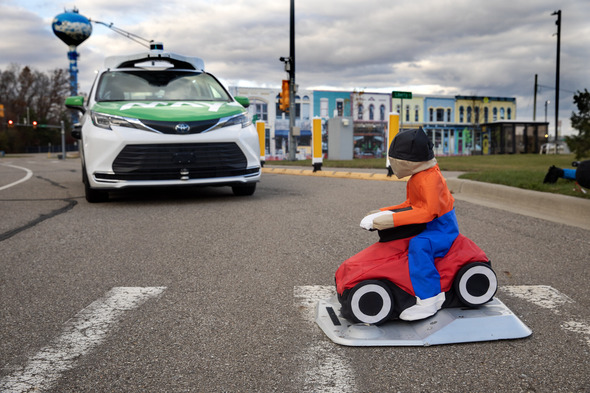
During testing, the driverless Accessibili-D vehicles stop automatically to let a “pedestrian” cross the street. Credit: Detroit Office of Mobility Innovation
By Donté Smith
Capital News Service
Detroit’s streets are becoming a testing ground for future transportation, with automated shuttles like Accessibili-D and Connect AV offering mobility solutions.
These shuttles, which started operating this year, help residents, particularly those with limited transportation, access essential destinations such as doctors’ offices and grocery stores.
The Connect AV shuttle provides fully electric, scheduled autonomous transportation along a 10.8-mile route connecting Corktown, downtown Detroit and the East Jefferson Riverfront. Operating on weekdays with 10-15 minute intervals during peak hours, the service is free.
In comparison, Accessibili-D is tailored for older adults and people with disabilities, offering free on-demand rides to vital locations such as medical facilities.
In 2023, the Detroit City Council unanimously approved both the $2 million Accessibili-D contract and the $1.67 million Connect AV contract.
“The goal of these first-of-their-kind projects, like Connect AV, is to future-proof our roads for the next evolution in transportation,” said Justine Johnson, Michigan’s chief mobility officer.
While the National Highway Traffic Safety Administration reports that 94% of vehicle accidents are due to human error, more than 580 crashes this year involving autonomous driving technologies were reported as of August.
The Insurance Institute for Highway Safety found that self-driving technology could potentially reduce accidents by about 34%, though challenges with avoiding, planning and decision-making remain.
Detroit’s automated shuttle vehicles were put through “rigorous self-driving testing” at the University of Michigan’s Mcity Test Facility to “ensure the technology is ready to safely serve” says Detroit Deputy Chief of Mobility Innovation Tony Geara.
Mcity, home to the world’s first purpose-built connected and automated vehicle testing ground, simulates real-world conditions to ensure these vehicles meet performance and safety standards.
Johnson highlighted the safety benefits of autonomous driving, saying, “By reducing human error and enhancing predictive maintenance, autonomous technologies provide safer, more reliable transportation.”
Beyond safety concerns, some Detroit residents say the shuttles don’t yet meet the city’s broader needs.
One of them, Nicole Johnson, expressed optimism about the technology but voiced concerns about the limited scope of the routes so far.
“It’s great that these shuttles are out here, but what about the residents who don’t stay downtown?” she said.
Even so Johnson said she is still excited about the possibility of her older relatives using the service for essential needs.
Detroit’s Office of Mobility Innovation has already extended Accessibili-D further north toward Highland Park, with plans for another expansion by October’s end.
Justine Johnson noted that projects like Accessibili-D, Connect AV and the connected and autonomous vehicle corridor in Detroit align with the state’s vision of growing Michigan’s mobility ecosystem.
“These efforts include personal vehicles, public transit and freight,” she said.
